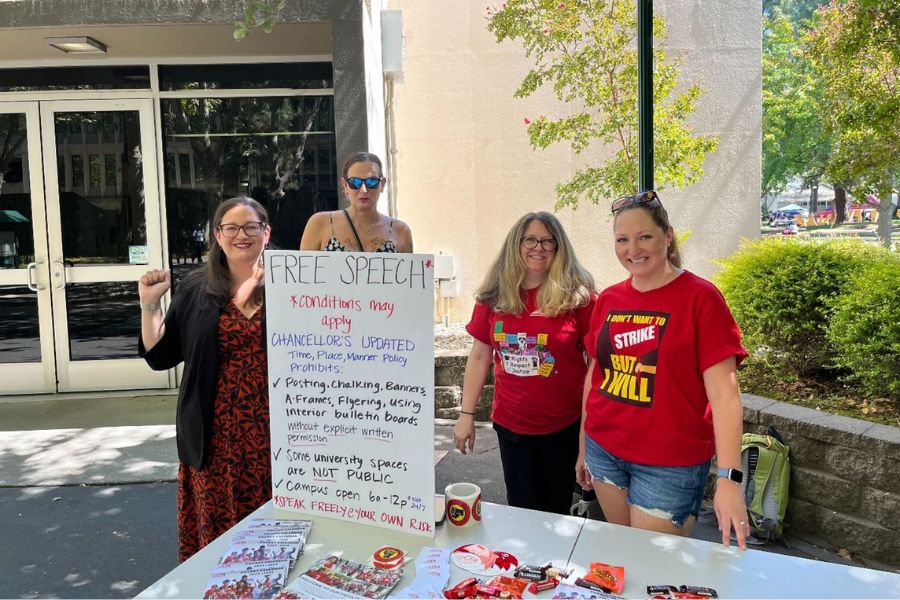Free Speech and Academic Freedom at Risk on CSU Campuses
The Chancellor’s Office has issued a directive as a companion piece to its systemwide interim “Time, Place, and Manner” (TPM) policy beginning this Fall semester. We informed faculty about the TPM policy last week. Next week, leaders from the union will meet and confer over the TPM policy. However, the Chancellor is taking the position that management need not meet and confer over the new “directive.”

Instead of notifying CFA members and other unions of the directive, campus administrators reached out to employees and misinformed all of us that the new systemwide directive is in effect immediately for everyone, including represented employees.
Applying the new “directive” to faculty (or any represented employees) before we meet and confer with management is a violation of the Higher Education Employer-Employee Relations Act (HEERA). Because of the Chancellor’s HEERA violation, we filed a charge with the California Public Employment Relations Board (PERB). Our charge alleges that the CSU administration has failed to bargain in good faith with our members in violation of Government Code §§ 3570 and 3571(c), and that the administration has established a new code of conduct that implicates performance and discipline of faculty. (Although some of the conduct prohibited by the Chancellor’s Directive is prohibited by state law, other aspects of the Chancellor’s Directive involved CSU’s exercise of discretion, over which we had a right to notice and an opportunity to bargain.)
While “time, place, and manner” policies have existed on our campuses for decades to regulate when, where, and how a campus is used, the new systemwide policy is a departure from past practices, as it is far more restrictive and oppressive than previous iterations.
Union members expect to be able to act collectively and engage in informational pickets over matters of concern. When and if the time comes, the union also expects to be able to take strike actions like we did last year. Under new TPM rules, union members could be severely restricted in engaging in much of the activism we undertook to get our latest contract. In other words, the new rules are broad enough to concern all faculty and members of the CSU community, as they could be applied in discriminatory ways.
The new TPM and the “directive” as well would, among other things:
- Limit the academic freedom of faculty, students, and staff: the ability to speak, teach, learn, research, participate in university governance, and work freely without interference from political figures, boards of trustees, donors, or other entities.
- Dictate “hours of operation” at campuses to ban people’s presence in buildings and areas at certain times, including times of scheduled classes and events.
- Enact an ableist ban on face coverings that protect the immunocompromised and shield people from being surveilled without consent.
- Restrictions on face coverings appear to contravene an individual’s right to wear specific religious attire, such as a burqa, hijab, or other head/face coverings.
- Establish broad language requiring written permission for posters, signs, banners and chalking.
Although management asserts that these policies are intended to ensure a safe and peaceful campus, we believe they’re aimed at suppressing protests (such as protesting the 34 percent student tuition increase or the more recent fee increase on some campuses), encampments, and future strike actions, all of which fundamentally undermine the civil liberties of faculty, students, and staff.
The new TPM policy also serves to justify maintaining and expanding police presence and surveillance on our campuses. This has already led to very troubling incidents, such as what happened on the Humboldt campus, where their former president called in more than 100 law enforcement officers with riot gear to forcibly remove and arrest students and faculty before completely shutting down the campus for the remainder of the academic year.
By implementing drastic measures that go beyond what is necessary to maintain order, this new policy will certainly discourage public discourse and civil engagement, as students and faculty will feel more threatened and less safe on their campuses.
As CFA members, we recognize the value that academic freedom and free speech have in promoting knowledge and supporting democracy. Our campuses should be sites that encourage critical thinking and challenge injustice in our communities and country at large. We should not have to fear censorship or retaliation when we speak from our hearts and tell our stories.
We will continue to update you as new developments on the statewide TPM policy unfold.
Join California Faculty Association
Join thousands of instructional faculty, librarians, counselors, and coaches to protect academic freedom, faculty rights, safe workplaces, higher education, student learning, and fight for racial and social justice.